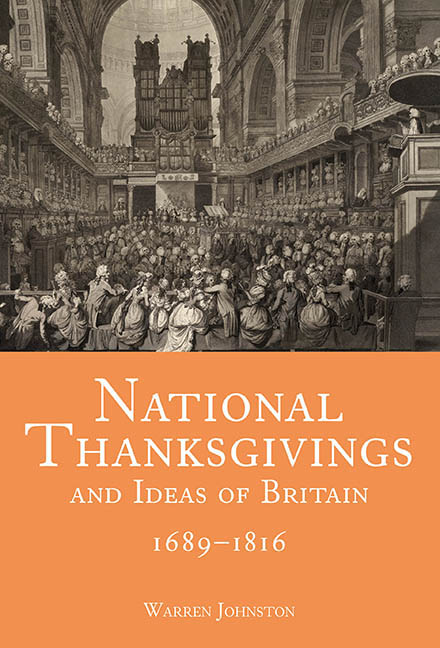Book contents
- Frontmatter
- Dedication
- Contents
- Acknowledgements
- Notes on elements of the text
- List of general thanksgiving days 1689–1816
- Introduction
- 1 Sermons and thanksgiving-day sermons in the long eighteenth century
- 2 Thanksgiving-day sermons – purposes and meanings
- 3 ‘The Palladium of our Safety’ – Providence and Britain
- 4 Political theory and principles
- 5 ‘This Carping Age’ – the politics of unity and discord
- 6 War
- 7 Costs of war and consequences of peace
- 8 Commerce and Empire
- 9 Anglicanism, dissent, anti-Catholicism, and infidelity
- 10 Others and Britons
- Conclusion
- Appendix A Thanksgiving-day preachers’ and sermon details
- Appendix B Denominational breakdown of thanksgiving-day preachers
- Appendix C Main scriptural texts used for thanksgiving-day sermons
- Bibliography of primary sources
- Bibliography of secondary sources
- Index
7 - Costs of war and consequences of peace
Published online by Cambridge University Press: 02 May 2020
- Frontmatter
- Dedication
- Contents
- Acknowledgements
- Notes on elements of the text
- List of general thanksgiving days 1689–1816
- Introduction
- 1 Sermons and thanksgiving-day sermons in the long eighteenth century
- 2 Thanksgiving-day sermons – purposes and meanings
- 3 ‘The Palladium of our Safety’ – Providence and Britain
- 4 Political theory and principles
- 5 ‘This Carping Age’ – the politics of unity and discord
- 6 War
- 7 Costs of war and consequences of peace
- 8 Commerce and Empire
- 9 Anglicanism, dissent, anti-Catholicism, and infidelity
- 10 Others and Britons
- Conclusion
- Appendix A Thanksgiving-day preachers’ and sermon details
- Appendix B Denominational breakdown of thanksgiving-day preachers
- Appendix C Main scriptural texts used for thanksgiving-day sermons
- Bibliography of primary sources
- Bibliography of secondary sources
- Index
Summary
While the celebration of military success was the predominant response to war in the thanksgiving-day sermons, this was not the only attitude represented, with some preachers pointing to its adverse impacts. Summarising the effects of the recent conflict in Ireland, in 1695 John Travers reminded his congregation at St Andrew's in Dublin of ‘the Ruins, and Devastations, the Wrongs and Oppressions, the Rapine and Violence, the Poverty and Complaining, the Blood and Slaughter that attended it’. Travers concluded ‘It stampt much the same impression upon our Land, that the Army of Locusts and Caterpillars did upon that of the late Jews; it found it like a Garden of Eden, but left it a desolate Wilderness.’ At the end of the eighteenth century, Richard Hardy told his University of Cambridge audience that war was ‘one of the calamities… inflicted by the angry Deity upon a sinful Nation’ and asserted that war was ‘a national calamity [that] originates in national crime’. Hardy was incredulous ‘that a Nation then should be so blind to it's own sins, as even to applaud itself under the idea of it's being engaged in a just War’. In the midst of celebrations of Trafalgar, Richard Warner accused preachers, publishers, and the government of promoting this ‘unhappy war’, noting that ‘Our press has for years teemed with fast and thanksgiving sermons, chiefly made up of bitter invectives against our foes; or of abuse by implication, in irritating comparisons between our own worth and their abominations.’
Though those who directly criticised British involvement in and celebration of warfare were a small minority, there were many other thanksgiving-day preachers who did mention the costs of war. This recognition included acknowledgement of the effects of war on the soldiers and sailors who were doing the actual fighting, as well as on those left behind and on those who returned from war, the societal results of war, the costs of funding warfare, and the economic impact of war. In addition to sermons that hailed victories, those that acknowledged or even criticised the costs of war contributed to the ongoing impression that military actions made on British society during the long eighteenth century.
- Type
- Chapter
- Information
- National Thanksgivings and Ideas of Britain, 1689–1816 , pp. 174 - 204Publisher: Boydell & BrewerPrint publication year: 2020



